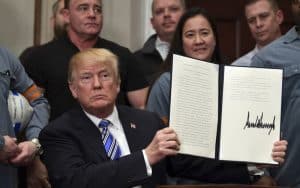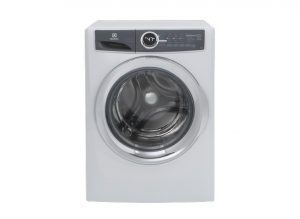
President Trump surrounded by invited tariff supporters
President Trump bent slightly his severe steel and aluminum tariffs to temporarily exclude Canada and Mexico but left other allied nations still exposed to their brunt. The President’s protectionist tariffs provoked a storm of protests from congressional Republicans, and many conservatives came out in united public opposition to Trumpism for the first time since the election.
We provide an important survey of their criticisms below.
Trump tariffs won’t kill jobs but…
Economics professor Benjamin Powell writes in Fortune magazine that “Trump’s Tariffs Won’t Kill U.S. Jobs. They’ll Create the Wrong Ones”:
The president claims tariffs create jobs. His critics say tariffs will destroy more jobs than they create.
Both sides misconstrue the situation. These tariffs won’t change the total number of American jobs; they will change the mix of jobs in a way that will make us poorer and less productive.
The classic case for free trade argues that when people are free to trade across national borders, the producers in each country will specialize in the products they make most efficiently. The fact that U.S. steel production has fallen nearly 20% in the last decade, while steel and aluminum imports have increased, indicates that U.S. capital and laborers are better employed in other industries….
No, Trump’s tariffs won’t cost the American economy jobs, but they will make us poorer and less efficient. There is nothing great about that.
Charles Koch weighs in
Charles Koch of the important Koch family, funders of numerous Republican, conservative, and libertarian causes, makes a similar point in a Washington Post op-ed:
Tariffs will not add thousands of American jobs. Instead, the research shows that, while they preserve some jobs that would otherwise disappear, they reduce many other higher productivity jobs. The net effect will be not more jobs, but lower overall productivity. They also reduce choice, competition, innovation and opportunity.
Hey, wasn’t this supposed to be about military security?
Jerry Sengenberger, a think tank president, writes in The Federalist that Trump’s issuing the aluminum and steel tariffs under the pretext of being necessary for national defense is obviously spurious:
China and national security seem to now be second fiddle to dealing with the perceived harm of an $800 billion trade deficit. Hence, the president has tweeted that “trade wars are good, and easy to win.” He seems to be embracing the idea of a trade war to address not national security issues, but the broader scope of trade partners….
Then, Trump’s tweet on March 5 shifted gears in another direction: “We have large trade deficits with Mexico and Canada. NAFTA, which is under renegotiation right now, has been a bad deal for U.S.A. Massive relocation of companies & jobs. Tariffs on Steel and Aluminum will only come off if new & fair NAFTA agreement is signed. Also, Canada must treat our farmers much better. Highly restrictive. Mexico must do much more on stopping drugs from pouring into the U.S. They have not done what needs to be done. Millions of people addicted and dying.”
Here Trump pivots to the North American Free Trade Agreement as the justification for the tariffs — meaning it’s apparently not about China, and not truly about national security, but about scoring a “fairer” NAFTA deal. The inconsistencies are abundantly clear.
Protect washing machines; then raise the cost of their inputs?!!

Trump protected washing machines, then undermined them with steel and aluminum tariffs
Writing in RealClearMarkets, a Miamo CEO asks “Does Anyone In DC Know How To Make A Washing Machine?” He writes (partially quoting a bill-of-materials source):
Many parts of a washing machine are manufactured from sheet steel, usually coated with zinc to improve rust resistance. The steel manufacturer supplies the metal in a coil, which allows the material to be cut to size with minimum waste or automatically fed into the forming process. On some models made by Speed Queen, the spin tub is made of stainless steel. All other models use a steel (called enameling iron) designed for a porcelain coating….
The transmission is generally made from cast aluminum, which arrives from the manufacturer in ingots—20 pound slabs of aluminum.
Will the steel tariffs negate the cost advantage gained by the previously imposed washing machine tariffs? I have no idea and I’d bet my last dollar that no one in the Trump administration does either. This is what happens when you start micro-managing the economy. A more sarcastic commenter might even call it central planning but I’ll refrain from that kind of demogoguery. Instead I’ll just say that the phrase “fatal conceit” never seemed more appropriate than when applied to this administration – in more ways than one.
Conservative George Will goes 100% negative
Few can compete with George Will in writing with a pen dipped in acid. He writes :
Regarding trade, Congress has given presidents vast discretion to trifle with Americans’ freedom, the nation’s prosperity and the world’s hard-won architecture of efficient commerce. Now this capacity for mischief is in the hands of someone who knows next to nothing about the one thing — business — he is supposed to know something about.
Protectionism is a scythe that slices through core conservative principles, including opposition to government industrial policy, and to government picking winners and losers, and to crony capitalism elevated to an ethic (“A few Americans first”). Big, bossy government does not get bigger or bossier than when it embraces protectionism — government dictating what goods Americans can choose, and in what quantities, and at what prices. Down the decades, Donald Trump has shown an impressive versatility of conviction, but the one constant in the jumble of quarter-baked and discordant prejudices that pass for his ideas has been hostility to free trade. It perfectly expresses his adolescent delight in executive swagger, the objectives of which are of negligible importance to him; all that is important is that the spotlight follows where his impulses propel him.
For more than a century, enlarged executive power wielded by agenda-setting presidents has been the sun at the center of progressives’ solar system of aspirations. Hence protectionism — economic life drenched by politics and directed by unconstrained presidential ukases. So, if on Nov. 6 the Democrats capture either house of Congress, on Nov. 7 there will be, effectively, an accommodating Democrat in the presidency.
Trump — so far — rallies but doesn’t persuade
Henry Olsen, author of The Working Class Republican: Ronald Reagan and the Return of Blue-Collar Conservatism, writes in today’s American Greatness, that “Republicans Should Be Tired of Being Number Two” — being dominated by the media and the issues they define, putting Republicans always on the defensive. President Reagan didn’t just rally Republicans. He also persuaded
…unhappy Democrats who thought the party no longer stood for their values…Lincoln, FDR, and Reagan succeeded because they rallied their base while persuading others to join them. Trump’s crude rhetoric and the perception that he levels unnecessary gibes at individuals and often entire ethnic groups is alienating people who could join him. He is gaining millions of working-class Obama voters, but he is also losing millions of college-educated suburbanites. The path to a new majority, one that can own the terms of debate rather than simply win elections and tinker at the edges, runs through both sets of voters.
Jack Kemp’s brilliant suggestion to avoid trade wars

Jack Kemp, intellectual co-author of the Reagan supply side economic revolution and prophet of the Transpacific Partnership non-trade-war response to President Trump
Allan Golombek has a kinder, gentler idea. He notes that the late Jack Kemp, Republican Congressman, author of President Reagan’s important 1981 Kemp-Roth tax cut, and 1996 vice-presidential running mate, came up with an idea whose time has come:
[T]here is a way for the EU, Canada and other victims of President Trump’s draconian tariffs on steel and aluminum to “do smart” – to retaliate against the U.S. trade action in a way that helps their own consumers, rather than inflicts more pain on them.
The idea is one that was proposed by former U.S. congressman Jack Kemp…Rather than raise tariffs on the country that launches a trade war (in this case the United States), reduce tariffs on every other country except that one. Rather than raise tariffs on imports from the United States, lower them on imports of the same goods from other countries.
The idea seems counter-intuitive – responding to trade pressures by giving improved access to your home market. But giving other countries improved access actually benefits your home market – making goods more cheaply and readily available to end-use consumers, making inputs and technologies cheaper and more readily available to intermediate suppliers, and opening new opportunities for supply chains….
[At the same this this turns] the heat up on the country that is trying to prevent you from exporting into their home market – by making it harder for them to export into your market, even as you make it easy for all of their competitors.
The eleven Pacific-bordering countries are doing just that
On the very same day that President Trump announced his 25% tariffs on steel and 10% tariffs on aluminum, the eleven countries of the Transpacific Partnership — originally twelve countries until Trump pulled the US out — are lowering their tariffs and other obstacles to each other’s mutual imports and exports. Now the US will have a tougher time exporting to these countries, which include Japan, South Korea, and Australia, because they will be able to buy the same or near-same products from each other more cheaply than from the US. The effect of their trade pact will be the same as what Jack Kemp proposed — to the advantage of the eleven but not the US.
Click here to go to the previous post of Founders Broadsheet (“Trump tariffs freeze investments, split Republicans, hurt allies, boost China”)

Leave a Reply